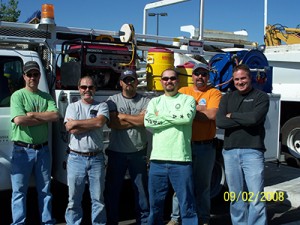Tom Dalzell, a veteran of the epic struggle to organize farmworkers under Cesar Chavez in the 1970s, brought to the office of business manager a belief in the power of bargaining. “I like moving money from the company to you,” he told members after becoming business manager in 2006.
In his first year, Dalzell negotiated a $25 million package to help PG&E retirees with rising medical costs, thwarted PG&E’s plan to close its front counters, negotiated voluntary severance pay for 174 PG&E Operating Clerical employees, and helped persuade the City of Alameda to preserve 100% employer-paid medical benefits.

Among the many IBEW 1245 members who fought privatization of Truckee Meadows Water Authority were, from left, Tim Flanagan, Chip Chadwick, Chris Hires, Jackson Bergland, Jon Rouse and Travis Bunkowski. IBEW 1245 Archive
But Dalzell saw that unions around the country were in decline. He began looking for ways that unions could fight back. IBEW 1245 members at Reno-based Truckee Meadows Water Authority (TMWA) provided a good example when they mobilized themselves with lightning speed to thwart an agency plan to outsource their jobs.
In another public sector battle, IBEW 1245 members at the City of Redding fought off repeated attempts by city officials to shift medical costs to employees, eliminate medical benefits for retirees, and move city jobs to private contractors. The union helped elect three Redding city commissioners with a more constructive view of labor relations.
These battles signaled that the union was heading into an era of all-out dogfights in full public view. It would not be enough to go to the bargaining table and hope for the best. To remain relevant, IBEW 1245 had to step up and find new ways of exercising power.